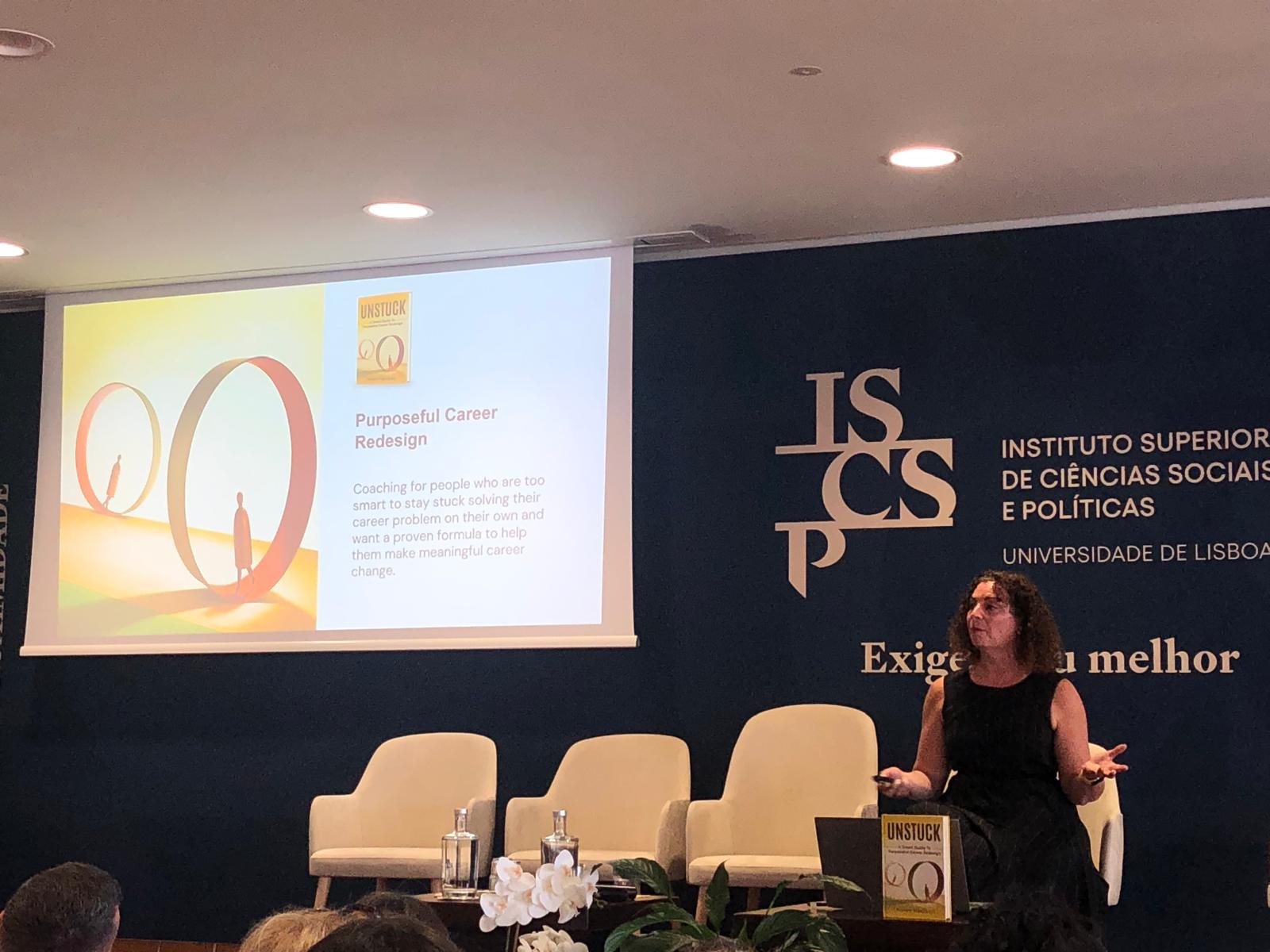If you don’t have a leadership coach, I don’t think you’re optimising yourself.
As a leadership coach myself, I’ll admit to being biased on this point. While I can’t know what the benefits of coaching will be for you specifically, I have absolute conviction about one thing: coaching works.
How do I know?
First, because I’ve seen the impact of one-on-one coaching on my own life. I’ve invested more money in coaching than anything else I have done (and I did two degrees!). Coaching always pays back like when I hired my first coach – and finally figured out who I was passionate about coaching and why, then tripled my client-base doing what genuinely feels more like a calling than work.
Second, because I’ve seen how powerful one-on-one coaching is for my clients. They don’t always come to leadership coaching knowing what their passion is.
That’s why it doesn’t work to say, ‘do what you love’. Clients do come knowing they’re not passionate about what they do today. Often, they are deeply unhappy but my cue to leadership coaching works when they know they’ll stay stuck on their own, despite knowing they need change. That kind of suffering is hard to watch.
The clarity that leadership coaching unlocks, illuminating what is meaningful, shaping intentions and well aligned action is why coaching can be powerful.
I’ve helped people discover what they would love to be doing and create career redesigns so they get to act on that.
Others want support to consolidate in promoted roles that they fought hard to win, only to live with daily overwhelm as their reward.
Another brand of help comes in the form of helping people shake off their corporate past to build their own business from scratch. Which is usually a healthy repurposing of strengths and skills they have accrued already, pointed at something that feels purposeful.
Leaderhship coaching is transformative for all of them.
WHY LEADERSHIP COACHING IS SO POWERFUL.
As busy professionals, we often forget to step back and reflect. A strong coach illuminates what’s important so you can see yourself. This leads to becoming ever more competent and successful at what we do.
But also brings a growing awareness of feeling unfulfilled when doing that doesn’t align with the life we want, doesn’t express signature strengths, and just isn’t meaningful. Therefore saps our energy.
I see so many people shaping their life around work, instead of the other way around. They might successfully break free from one professional prison only to move into a new one because they aren’t clear on what would make the real difference. It takes being in their new normal for a while to get clarity … that it’s all wrong…again.
The benefit of having a good leadership coach in your corner, is making sure that this never happens.
And if you are a coach yourself, you should still work with the best coach you can. Why? Because a coach who hasn’t been coached is a walking contradiction, asking people to trust a process that they don’t commit to themselves. This is equally true of consultants, trainers, mentors and so on.
WHAT A LEADERSHIP COACH CAN HELP YOU WITH.
Coaching as a profession is unregulated. This means you’ll find all different types of people calling themselves coaches, each with different levels of training, skills and their own process.
For example, I call my process ACT – Aligned, Career Transformation – and my formula for purposeful career redesign focuses on these 3 ACTs :
- Alignment. Clients stand at some sort of career crossroads as we kick off together. We want to make sure career redesign choices realign work they love with those things they’re best at but also matter to them most. Only then will they feel clear and confident about taking even the most disruptive next steps to make their wanted change happen.
- Career Redesign. Only once we know what you bring and what you need from your career redesign, can we make a robust plan. You will dream big but then break the dream down into small, safe agile microsteps that pilot test your thinking. That way, when you wake up each morning, you are motivated to do what is needed to build forwards. Goals are the dreams we act on after all.
- Transformation. Once the redesign plan is clear, fears typically get louder. We meet any obstacles that threaten to get in your way or slow you down. We also bring some consciousness to old stories that threaten to hold you stuck. They may make some sense, but they’re outdated. We reframe and shift their power, together. What if it could be easier? We work co-actively to utilise these narratives or navigate them – emotionally and in practical and pragmatic ways. That way, your commitment to your choices was challenged. And you won.
- Now you have confidence and conviction in your plan. It’s time to act on it. This is a time for real accountability. And good coaching will not waver in holding your vision firmly as you take steps to make change stick. As you are held accountable for the aligned career transformation you chose to ACT on.
These are basically the three ACTs of Purposeful Career Redesign. If you are missing any one of them, it is very hard to realign work you love with the life you want to lead.
Which brings us to our first distinction:
MENTORING VS. CONSULTING, COACHING VS. COUNSELLING
Some people call themselves coaches, but in reality, they are mentors or consultants. So, what’s the difference between the three? And how do you know which is right for you anyway?
A mentor is someone who’s already done the thing that you want to do. They’ve gone before you on the journey that’s aspirational for you today.
They’ll give you their perspective and can help you avoid watch-outs they experienced. Some mentors are free, some are paid.
A consultant is an expert you hire to solve a specific problem within your business. They typically do some sort of diagnostic to find your areas of weakness and then implement part or all of the solution. You hire this type of person because you need answers that you can’t find yourself or want someone objective to identify and handle the scope of work for you.
Counselling has some overlap with coaching, in that it seeks to reframe emotional and cognitive narratives from someone’s past and equip them with awareness and techniques for specific behavioural change too.
Therapists are required by law to be licensed and they tend to specialise in supporting specific mental health issues with right-fit therapeutic practices.
Sometimes people bring a blend of experience which can be powerful. For instance, I bring prior experience as a consultant, where mentoring others was part of my role and have since become qualified as a Leadership Coach and Narrative Therapist.
WHICH ONE IS ON POINT FOR ME?
So, how do we know if we’re right for counselling vs. coaching? When past events are so deep-seated, their experience has impacted our mental health and interfered with our everyday functioning.
Then the individual needs to explore and reinterpret their past and work on the linked problems that show up in their everyday. A good coach would recognise this distinct need and make the appropriate recommendation or referral. Sometimes therapeutic support can work nicely in parallel. Other times coaching can follow on.
A leadership coach meets a client where they are today. While past narratives are explored when they show up as obstacles, and time is spent with whatever emotions they spark, there is a reframing that takes place in coaching. So the past story is accepted but from a new perspective, one that doesn’t get to block forwards-motion. Because good coaching operates on the premise that people are all naturally creative and resourceful. The brand of help on offer isn’t to fix a person because it doesn’t need to be. And so the focus can come back to the future and being in action.
A strong coach empowers their client to reach their fullest potential by reigniting agency and guiding them to find their own answers. And by supporting them in making sustainable change. Coaching is a unique skill-set, which is why the best performers often don’t make the best coaches (and why the best coaches can be profoundly effective even if they don’t have experience doing what the client wants to do).
Of course, there’s plenty of overlap here. There are ‘purist’ views that someone should only offer one strand of support. I actually believe the best coaches can flex to bring a blended approach. I know my unique offering blends my marketing savvy and corporate edge with the purposeful piece that I’m so very passionate about. It serves my clients well – but I am up-front about the hybrid of expertise I make available to clients. And so long as we’re a good fit together, I know it adds enormous value.
If all you want to do is learn a specific skill or be told what to do and get it handled, you are better off getting the help of a mentor or consultant. If you ruminate about the past and being honest, find it hard to move beyond that in your everyday, you might like to seek therapeutic support as a first step. Coaching can follow a bit later.
If you happen to find a coach who has been where you are now (and there is a school of thought that the most passionate coaches end up specialising in making things easier for their past selves!) they may break out of coaching to offer guidance at times.
I personally feel I’m cheating if I don’t let my clients know they are welcome to benefit from my years as a PR and branding expert, knowing how I navigated obstacles when I moved countries, sharing how I left a long-established profession, reeling from redundancy, had an identity crisis as I moved into motherhood, felt directionless in my Lost Years and (much), recalibrated after health hiccups and started my own business.
Successfully. After too long. All those experiences honour the whole me as I get to support them in their aligned career transformation.
But while my intention in this area is high, so is my integrity. My agenda that a client follow any personal learnings whatsoever is low. It is your career redesign, your life, your plan, your agenda to hold and you are at choice. Always. This is one of the most significant things that has changed over the decades that coaching has been a thing. And the ownership this ‘light touch’ gives clients makes it pivotal to good leadership coaching.
PERSONAL VS. BUSINESS VS. LEADERSHIP COACHING OR A BLEND?
You may notice that professional change sounds like only one part of the equation. It’s true that personal transformation gets unpacked too. Inevitably really – we are all one person. You will be moving out of your comfort zone to plan work you love around things that matter most to you, so the two always show up entwined. As they should be.
A good leadership coach will be open on this piece and help you design your collaboration together. My coach training called this co-active. How do you want your coaching to feel, where are the no-go zones for you, do you understand the responsibility for change rests with you? In coaching, the partnership is between two equals after all – unlike mentoring, consulting or even counselling.
Broadly speaking, there are three main strands of coaching. Here’s a rundown of them all:
Personal coaches (or life coaches – although it says what it does, I don’t much like the term) work primarily on developing the individual they are working with. This development is almost always tied to an external outcome or some uncertainty specific to the client (health, relationships, career, business).
But also flourishing. Optimising Yourself. Work-life synergy. Integrating identity-roles. And in this, they overlap with a good Leadership Coach. Good Leadership Coaches do this same work but specifically with experienced professionals, and those on their way.
The additional focus of this type of coaching ranges from leadership, communication, and conflict / stress management. Some will specialise in working with larger businesses with more resources and growth potential – and charge more. Others will focus on the individual, from the perspective of supporting their needs and wants regarding career fulfilment and not mere success.
From shaping their aspirational next steps, regardless of whether that’s levelling up on their existing pathway, pivoting to a new career context or even spring-boarding into business using their skillset and playing to their personal passions instead. If you are offered a coach from within your corporate home, it’s a good idea to ask which their emphasis will be – the professional scope or is personal ‘on the table’ also? How will that work? Will your sessions be confidential?
Business coaches are focused on helping people start or grow their business. While their work still develops the business owner or entrepreneur as a person, the primary goal of the coaching is usually to achieve a positive and significant revenue increase for the business. The emphasis is therefore different, more commercial. Because this type of work generates a clear financial return on investment, business coaches tend to charge more than their personal counterparts.
Most entrepreneurs have a tight integration between their business, leadership and life. Most seasoned, successful professionals come to leadership coaching because they feel unfulfilled precisely because they no longer have that integration. Powerful coaches will blend their approach by dipping into all three buckets when needed. For me, this is another critical quality marker for high-end, bespoke coaching.
ONE-on-ONE COACHING VS. GROUP COACHING.
Coaches typically work with clients in one of two ways:
Private Coaching agreements are typically co-created by the coach and client in order to meet tailored goals in a specific amount of time. Sometimes there is a set programme, but this is rare for 1:1. Private coaching is usually more expensive than group coaching. For a good reason. It allows the client to move faster and go deeper because the coach’s focus is entirely on them and the support they get is also utterly bespoke to their needs. One-on-one coaching support will feel both strategic, defining the very goals that will realise your vision (often you find a strong coach holds a bigger vision for you than you do yourself at the start!) but crucially, you will feel supported to implement those actions.
Group Coaching agreements involve more than one client at a time. These are most effective when they are designed for a specific type of client wanting a specific result – that way the one-on-one coaching that takes place is tightly relevant to everyone. The main benefit to group coaching, besides the reduced cost, is the sense of community and camaraderie that comes from being around like-minded people on the same transformative trajectory as yourself.
Each of these models can be done in person or on Zoom (or similar). It’s important to know what’s on offer and make sure it’s what you feel most comfortable with.
HOW TO FIND A GREAT LEADERSHIP COACH.
If you’ve made it this far, you’re probably interested in working with a leadership coach. Unfortunately, there a lot of bad coaches out there. The barrier to entry is so low.
Here are 3 ways to make sure you get one of the good ones:
1. Referrals and Testimonials. Referrals and testimonials are king in the coaching world. Is this person used to coaching others with your background or goals? Have they achieved results for their clients similar to the ones you aspire to?
2. Thought Leadership. Most good leadership coaches are also writers and/or speakers. Sign up to receive their work in your in-box. It’s an easy way for you to get to know them. It will tell you a lot about their style, personality, and philosophy. And even in writing, good coaches will find ways to add value. It might even spark some action this way.
3. Clarity Conversations. I feel strongly that you shouldn’t pay for a coach until you’ve experienced their coaching in some form. Why? Because there’s something even more important than referrals, testimonials, and thought leadership: fit with you! Coaching is, at its core, a partnership. You need to get to know each other before you get serious!
Big watch out. You will NOT be asked to pay for this conversation by any coach operating from integrity. It’s like putting a deposit on your first home together before the first date. Why would that be ok? Avoid anyone who uses that first clarity call as a channel of income. Really. They don’t have faith in their own offering.
You should come away from this first (complimentary) call feeling like something has already shifted. You’re excited about the possibilities where you were stuck before, and you’re clear on the value working in partnership with this coach, confident that change would happen if… And feeling a bit scared is normal too – change is about to happen! Plus it’s scary to invest in yourself. It’s ok to feel a bit of fear – and it’s exactly why you will benefit from having a good leadership coach in your corner. Change happens via disruptive steps. So support is important. As the coach, I need to make sure that I am inspired enough on my clarity conversations to hop on the phone with someone a few times a month.
We clicked in our conversation. I know I want to help and I care. Oh, and be rock solid someone is genuinely ready to act on their wanted change. Otherwise we’re doomed to get stuck in a cycle of talking about but not acting on solutions to their career problem.
Notice that certifications are not on the list. These days, you can literally get certified as a coach in a matter of days. I haven’t noticed a very strong correlation between number of certifications and quality of coaching. Often certification will indicate that the coach has gone deep in one approach and what they’re certified in is that single ‘school of thought’.
Where a coach demonstrates they are continuously developing expertise across different coaching approaches, they will have a broader and set of tools to weave into your coaching together. And that’s what’s important. Certifications do not guarantee a high level of training or experience. Rigorous training does though – ask questions about that. Was their training online or in-person? Was it hours, days or months to complete their training? Is the training they did, ICF (International Coach Federation) accredited? Get curious here.
WHAT TO EXPECT WHEN HIRING A LEADERSHIP COACH.
The pricing, length, and frequency of a coaching engagement varies widely. A good coaching agreement will be based on the needs of each individual client. But here’s a general idea of what you’re in for:
Length: Experienced coaches usually charge for 6–12 month packages, or on a retainer basis, instead of by the hour. Some programmes are shorter and can last between 8 weeks and 3 months if their remit and your need is specific. You should hear alarm-bells if your coach operates on an hourly basis. How can they be aligned with achieving goals around your transformation and meaningful change in ad-hoc hours?
Pricing: Depending on the type of engagement, leadership coaching can cost between £500/month – £5,000/month or more.
Frequency: 2–3 times/month is typical. But again, it all depends on the client. And the coach (At points, I am in touch with some of my clients almost every day). The time you spend is less important than the insights and transformation you spark and the support so change ‘sticks’. It’s about value not hourly pay.
It’s not a flippant decision to hire a leadership coach. So, is coaching worth the investment? That will depend on how committed you are to taking action as a client.
If you believe that coaching works (and it does), then a better question is this:
IF YOU KNEW TIME WAS RUNNING OUT FOR YOUR CAREER TRANSFORMATION, WOULD YOU STILL DO WHAT YOU’RE DOING TODAY?






